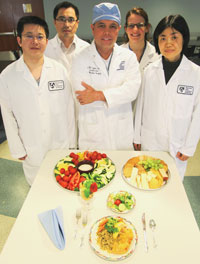Diet Before Surgery May Affect Recovery
 |
C. Keith Ozaki (center) and his team
are studying how body fat responds to
surgery. |
During most operations, surgeons have to first cut through fat tissue to get to the organs that they need to fix. Although the objective is to mend the broken organ, the snipping and slicing of fat may have a negative impact on a patient’s recovery after surgery.
In a lab setting, a research team led by C. Keith Ozaki, MD, director of BWH Vascular Surgery Research, measured how body fat responds to surgery. The team also looked at whether restricting calorie intake before surgery changed how fat responded to the typical trauma that occurs during an operation.
The researchers found that injuring fat greatly changed chemicals in fat that are used to communicate with organs. They also noticed an imbalanced chemical response in fat tissue in mice on a high-fat diet who underwent surgery. On the other hand, some mice that were switched from a high-fat diet to a lower-fat diet before surgery had a more normal chemical response in their fat tissue.
Based on these laboratory findings, researchers want to test the short-term diet-restricting method in humans before surgery to find out whether it will decrease surgical complications associated with fat’s chemical reaction to surgical trauma.
“Clinicians at hospitals, such as the Brigham, devote enormous energies during the operation and post-operatively to reduce surgical complications, yet pre-operative actions may also protect patients,” said Ozaki. “Simply cutting out certain dietary elements may be a feasible, inexpensive and effective way of protecting the body against stress from an operation.”
Ozaki and his team hope to further study this method in patients undergoing vascular surgery—a population that faces increased risks of surgical complications, including wound-healing problems, heart attack and stroke. Patients in this population have an abnormal activation of stress response in the body, such as inflammation, which underlies these surgical complications.
“The relationship between surgical outcomes and obesity has always been complex,” said Ozaki. “Our results and those of others highlight that the quality of your fat tissues appears to be important, along with the total amount of body fat when it comes to the body’s response to an operation. The findings challenge us to learn more about how fat responds to trauma, what factors impact this response, and how fat’s response is linked to the outcome of individual patients.”